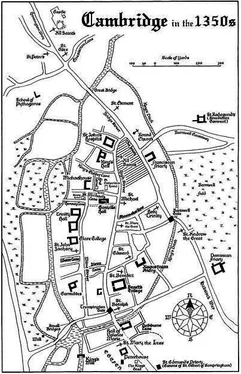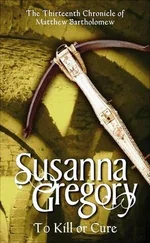‘But then come January and February,’ said Bartholomew gloomily. ‘I dislike those months, They are dark and cold, and it is painful to lose patients from afflictions of the lungs – like Dunstan the riverman. He will not see Easter.’
Michael was silent. Dunstan had been a loyal, if toneless, member of his choir for many years, and he was fond of the old man. It was hard for him to see Dunstan’s suffering and be powerless to help.
‘These are strange times,’ announced Suttone, walking out of the hall with them. ‘The Devil stalks the land, and God and His angels weep at what they see. Sinful men fornicate in holy places and debauchery, lust and greed are all around us. The river freezing in November is a testament to the fact that the end of the world is nigh. Things were different when I was a boy.’
‘People always think the past was better than the present,’ said Bartholomew, who had grown used to the Carmelite’s grim predictions. ‘But I do not think they are very different now – except for the Death, of course.’
‘The Death,’ pronounced the Carmelite in a booming voice that was sufficiently sepulchral to send a shiver of unease down Bartholomew’s spine. ‘It will come again. You mark my words.’
‘But not before Christmas,’ said Michael comfortably. ‘We shall at least have a good feast before we die.’
Bartholomew found he could not dismiss Philippa from his thoughts, and barely heard Suttone regaling Michael with details of the plague’s return as he walked across the yard to his room. He recalled how she had admired the fine oriel window in the hall, but had thought Bartholomew’s chamber cold and gloomy. He remembered walking with her through the herb garden, when the summer sun warmed the plants and sweetened the air with their fragrance. And he was reminded of the times he had climbed over the College walls like an undergraduate after the gates had been locked, because assignations with her had made him late.
‘I thought you might like this,’ said the insane Clippesby shyly, breaking into his thoughts by sidling up and offering him a stained and lumpy bundle. Bartholomew could see a glistening tail protruding from one end of it. He was being offered the fish that Clippesby had taken to breakfast.
‘He has just eaten,’ said Michael. ‘He does not need to consume a squashed pike just yet, thank you. And anyway, it has been dead far too long already. It stinks.’
‘It is a tench,’ said Bartholomew. ‘Where did you find it, Clippesby?’
Clippesby was pleased by the physician’s curiosity. ‘On Milne Street, near Piron Lane. It had been tossed there, probably by someone walking past.’ He turned a resentful gaze on Michael. ‘Matt knows perfectly well that I am not bringing this for him to eat. It is common knowledge that tench have healing powers.’
‘Do they?’ asked Michael of Bartholomew doubtfully.
Bartholomew nodded. ‘Pliny says that tench applied to the hands or feet can cure fevers, jaundice, head pains and toothache. But, more importantly, I am sure this was the fish I saw the night Norbert died. Whoever pushed me over grabbed it before he escaped.’
‘Then how did it end up abandoned on Milne Street?’ asked Michael. ‘It is a wretched thing – already rotten, despite its salting. Why would your attacker risk capture for it?’
‘Perhaps he did not know its state when he acted,’ suggested Bartholomew. ‘He only learned it was bad when he took off the wrappings – at which point he discarded it.’
‘It was thrown into some bushes,’ added Clippesby helpfully. ‘I would not have noticed it, but one of the cats mentioned it was there, so I went to look.’
‘A cat told you to ferret about behind some shrubs?’ asked Michael dubiously. ‘You should choose your friends more carefully, man. You do not know what you might unearth, foraging around in places like that.’
Bartholomew surmised that Clippesby had observed a cat expressing an unusual interest in the spot where the fish had been thrown and had gone to investigate. The mad musician’s claims about talking to animals nearly always had some rational explanation behind them.
‘We have already deduced that Norbert’s killer and the man who pushed me were not the same,’ the physician mused. ‘So, I suppose this means that the tench is also irrelevant.’
‘Probably,’ said Michael. ‘But I do not want to dispense with evidence prematurely. Will you store it in the basement, Clippesby? Hide it well, or we may find it served up for dinner in a week. You know how Michaelhouse’s nasty policy of “waste not, want not” works these days.’
Smiling amiably, Clippesby wandered away with his fishy prize, stopping to exchange pleasantries with the porter’s cockerel as he went.
‘Do you really think the tench might be significant to Norbert’s case, or was that just a ruse to remove Clippesby and the rank odour of fish?’ Bartholomew was laughing.
Michael remained sombre. ‘Both. William thinks it will be simple to solve Norbert’s murder, because it will be easy to identify people who did not like him. But he is wrong: I think it will be very difficult to isolate the real culprit. Perhaps your assailant had nothing to do with Norbert, but I will keep him in mind until I am absolutely certain. And since he considered the fish sufficiently important to grab before he ran away, we shall keep that, too.’
‘Look,’ said Bartholomew, pointing to the front gate as it was suddenly flung open and an important visitor was ushered inside. ‘There is Sheriff Morice, waving to catch your attention. He is all yours, Brother. I have work to do, and I should probably pay my respects to Phillippa …’ He faltered. Meeting the woman he had almost married was not something he wanted to do at all.
‘Wait,’ said Michael, shooting out a fat, white hand to prevent Bartholomew from escaping. The physician did not bother to shake him off. He had decided that an interview with the corrupt Sheriff was infinitely preferable to an encounter with Philippa Abigny. ‘I do not trust him,’ Michael continued, ‘and it would be good to have a witness to anything he says.’
‘Brother Michael!’ said Morice, advancing on the monk with a smile that reminded Bartholomew of a leering demon he had once seen on a wall painting. Morice was a dark-haired, swarthy man with curiously blue eyes and a beard and moustache that went some way, but not all, to disguising a mean-lipped mouth. His shoulders were slightly rounded, and he might have been a scholar, were it not for his extravagant robes and handsome water-resistant boots.
‘Sheriff,’ said Michael politely. ‘What brings you to our humble abode?’
Morice looked around him, noting the rotting timber and the loose tiles on the roof, and seemed to concur with Michael’s description. ‘I have come about Norbert. The boy was a wastrel and the Tulyets are well rid of him, but murder is murder, and I do not want the relatives of wealthy merchants slain on my streets. Have you done anything or shall I look into it?’
‘I have been investigating,’ said Michael coolly. ‘Norbert was a student, and therefore his death comes under University jurisdiction.’
‘But he was the kinsman of a burgess,’ said Morice, not at all disconcerted by Michael’s unfriendly tone. ‘So his death comes under my jurisdiction, as far as I am concerned. Will you hand the culprit to me now, or shall I hunt out the guilty scholar myself?’
‘What makes you think the killer is a scholar?’ asked Bartholomew, feeling his hackles rise at the man’s presumption. ‘Since Norbert spent his last few hours in a tavern, it is likely the murderer was a patron of the King’s Head – a tavern frequented by townsfolk.’
Читать дальше












